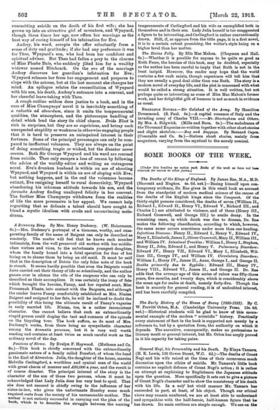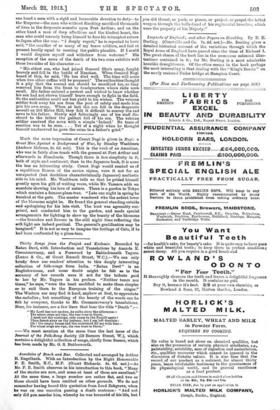General Nogi, his Personality and his Death. By Kinya Tamara.
(H. K. Lewis, 136 Gower Street, W.C. 6d.)—The deaths of Count Nogi and his wife raised at the time of their occurrence much discussion upon the ethics of suicide. Mr. Tamara's little book contains no explicit defence of Count Nogi's action; it is rather an attempt at explaining to Englishmen the Japanese attitude upon the question. More specifically it sets out to give a picture of Count Nogi's character and to show the consistency of his death with his life. In a fiat/ bat vivid manner Mr. Tamara has succeeded in part, at least, of his object. Though our ethical views may remain unaltered, we are at least able to understand and sympathize with the half-heroic, half-human figure that he has drawn. Its main outlines are simple enough. We see on the
one hand a man with a rigid and inexorable devotion to duty—to the Emperor—the man who without flinching sacrificed thousands of lives in the desperate assaults upon Port Arthur; and on the other hand a man of deep affections and the kindest heart, the man who could scarcely bring himself to face his triumphal return to Japan after the war : " I deeply regret," he is reported to have said, " the sacrifice of so many of my brave soldiers, and feel at present hardly equal to meeting the public plaudits. If I could I would disguise myself and withdraw from welcome." His reception of the news of the death of his two sons exhibits well these two sides of his character :— " His eldest son, who had joined General Oku's army, fought bravely and fell in the battle of Nanshan. When General Nogi heard of this, he said, 'He has died well. The time will come when two other coffins will be prepared.' The authorities thought it a pity that the second son should be sacrificed too, so they removed him from the front to headquarters where risks were small. His father entered a protest and wished to know whether his son bad not shown himself brave enough to fight in the field. So the authorities could not but yield to his wishes. The veteran soldier took away his son from the post of safety and made him join his own army. When at last the son fell in the desperate assault on 203 Metre Hill, they felt it difficult to convey the sad news to his father. Slowly and falteringly one of his staff dis- closed to the father tho gallant fall of his son. The veteran soldier received the news with a simple 'Indeed.' No trace of emotion was to be seen. . . . Yet of a night when ho thought himself unobserved he gave the reins to a father's grief."















































 Previous page
Previous page